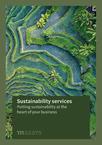New year, new opportunities.
For a start, it is only affecting the largest companies in Denmark. According to ESG Taxonomy, listed companies with more than 500 employees need to report accordingly to the new standard for the financial year ended December 31st, 2021.
However, it will also indirectly affect the rest of the Danish businesses. As mentioned in previous of our For Good Stories the largest companies will look at their value chain and partnerships. Questions like “Where can we improve? and Who will we need non-financial reporting from?”, will be more and more common. How your company acts on non-financial reporting (also known as ESGs) will now be essential for the future business and success rate.
In this story we will enlighten you in what we are doing at Mazars in Denmark to ensure our future success within non-financial reporting, including which KPIs we find important together with how we share it.
Reporting and measurement
Our inspiration comes from “ESG key figures in the annual report” developed by FSR – danske revisorer (CFA Society Denmark) and Nasdaq. Non-financial reporting is split in Environmental data, Social data, and Governance data.
It is important to choose the ESGs that make sense and add value for your company. It is also just as important not to exclude an ESG now, because it reflects poorly. Instead, it can show there is an improvement over time. You will need to have reliable and accessible data. Data that you can measure and analyse just as you do with the financial data for the annual report. If you are not already started, we advise you to start gathering this data now!
Besides the standard ESGs mentioned above, we have in Mazars in Denmark selected additional sustainable initiatives, which we want to measure and analyse over coming years. These initiatives to ensure sustainable awareness in our organisation, our DNA, and to gain employee satisfaction include:
- travel awareness and tracking of flight miles;
- annual code of conduct training;
- annual community day;
- executive board compulsory training in conceptual bias, diversity & inclusion etc.;
- minimum two counselor meetings a year;
- measure “workplace”-assessment result;
- annual first aid course, and
- annual footprint calculator test and measurement of improvements.
We gather the above data automatically and/or by using data tools. It might be necessary to think differently and to be creative in finding ways to extract the non-financial data for starting a registration, just as gathering financial data. Following this, it makes sense to involve the local finance function as they are familiar in gathering financial data and they can contribute with this experience.
This will in the long run ensure a quality at the same level as the financial reporting data, which means reliable data.
Sustainability services
For a business like our business, we also need to measure our activity and the development in demand for non-financial reporting assistance also known as sustainability services. As this is a new service we offer, it becomes natural that we measure the number of declarations and hours spent on these specific tasks.
We offer our assistance with non-financial and business advisories, in order for your company to be ready for the new and upcoming legislation.
For more information about these services, please download the below brochure.





